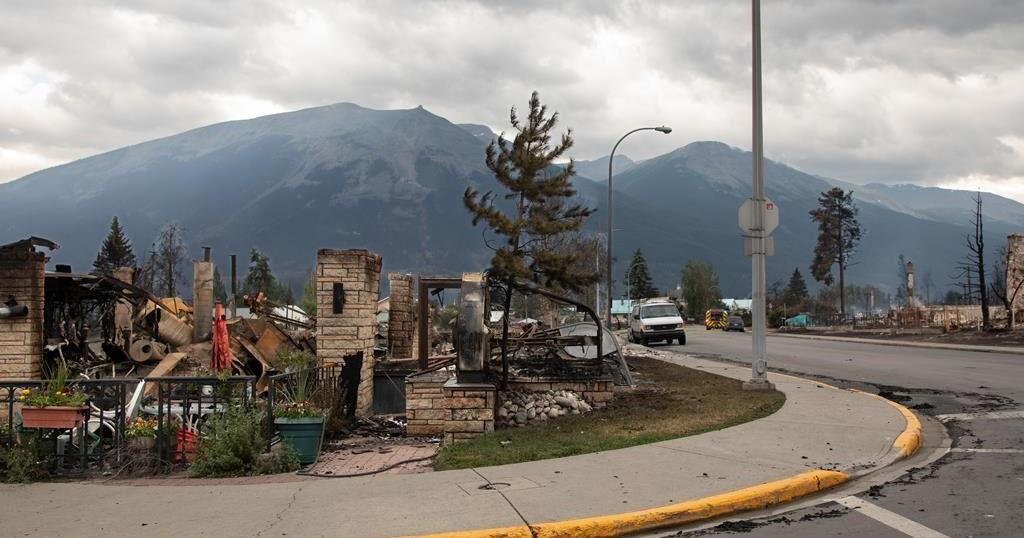After labouring for months to bring one of Jasper’s newest business concepts to life, the owners of The Peacock Cork & Fork never dreamed the young restaurant’s run would be so short-lived.
“Rest in Peace you elegant beast. June 12 – July 20, 2024,” the Peacock’s owners wrote on social media on Saturday, just days after wildfire swept through the picturesque Alberta tourist town and destroyed the roof of the building housing their new venture.
“It was open for 40 days,” said co-owner Ashley Kliewer in an interview, adding the fine-dining restaurant with its four-course chef’s menu and curated wine pairings was something Jasper had never seen before.
“When it’s something that you loved, and that you poured so much energy into, it makes it so much more crushing.”
The business community of Jasper — a town whose economy depends on tourism, particularly in the crucial summer season — is facing an overwhelming challenge in the months ahead.
Residents have not yet been able to return, so Jasper’s small business owners have been scouring photos from firefighters and other officials to try to ascertain the extent of the damage to the community’s shops, restaurants, boutiques and hotels.
Federal officials have said about one-third of the buildings in the Jasper townsite were lost in the blaze, and it’s already clear that some business owners lost their homes as well as their businesses.
“My main residence is in Calgary, so I’m OK, but my parents’ home unfortunately did not make it and both my business partners’ homes are gone,” said Brett Ireland, co-owner of Jasper Brewing Co., which suffered “significant damage” due to the flames that reached the commercial strip of Connaught Drive.
Like Kliewer, Ireland also had a new business venture that was affected. He and his partners were in the final stages of staff training for the soon-to-be-opened Maligne Range distillery when the evacuation order hit.
“No one’s been able to get into it yet,” Ireland said of the new business.
“So we don’t know. From the outside it appears it’s in pretty good shape, but we’re bracing ourselves. We expect there could be pretty significant smoke damage.”
Last week, credit rating agency DBRS Morningstar estimated the Jasper wildfires could cost the insurance industry up to $700 million, making it one of the most expensive wildfire disasters in Canadian history.
The agency said insurers will likely face significant claims from businesses with respect to commercial buildings and business interruption losses.
Kliewer — who spoke over the phone from Edmonton, where she, her husband Mike and her two young children have been staying since being forced to evacuate last week as the fast-moving flames approached — said she has business interruption insurance. But she said it will only cover her revenue losses for a few weeks.
“And we had taken all of our earnings and put it into this new restaurant,” said Kliewer, who also co-owns The Raven Bistro, another Jasper restaurant.
“And we did have to pay to get into the new space, and that goodwill money is not insurable. So that’s just gone.”
Ireland said when and if business owners get the all-clear to go back, reopening will be complicated by the staffing situation. Even before the fires, Jasper struggled with a labour shortage. Now many of the community’s seasonal workers have returned to their home cities or provinces, and no one knows how easy it will be to lure them back.
“One hundred per cent we will be rebuilding and reopening, that’s for sure,” said Ireland.
“It’s just a matter of what the timeline looks like … The staffing situation is going to be the biggest thing for sure.”
During an update Tuesday, Alberta Emergency Management Agency spokesman Joe Zatylny said there were no timelines for when Jasper residents and business owners can return home or tour the damage.
Re-entry will happen once the wildfire calms down and the area is safe, he said.
Kliewer said while that makes sense, she can’t make a plan for how to rebuild her business until she can get in and see first-hand what remains.
In the meantime, she’s fielding questions from staff and customers, dealing with insurance and watching as the bills roll in — all while trying her best to cope with the stress of it all.
“I almost fell asleep on the floor of Walmart this week while buying my kids some shoes because I find my brain will just shut down. I get overwhelmed and all of a sudden, I just feel like I could close my eyes and it’s like my brain short-circuits,” Kliewer said.
“I have no doubt that Jasper will eventually return and be beautiful and we’ll figure out a way to make it even more magical than it was before. It’s just in this time, with all of the variables, it’s really excruciating.”
– With files from Jack Farrell in Edmonton
This report by The Canadian Press was first published July 31, 2024.

























